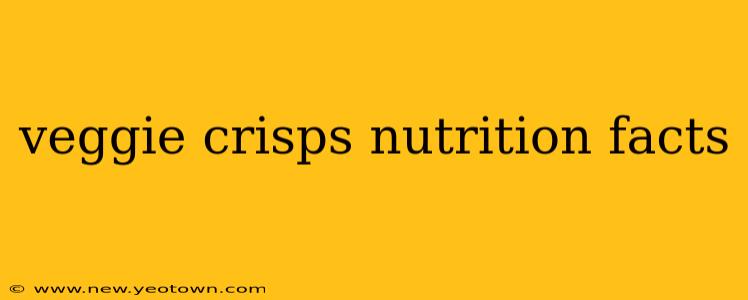Let's be honest, veggie crisps are a delicious snack. That satisfying crunch, the burst of flavor… it's hard to resist. But beyond the taste, what's the nutritional story behind these crunchy delights? We'll unpack the facts, explore common questions, and help you make informed choices about this popular snack.
What are the nutritional benefits of veggie crisps?
The nutritional profile of veggie crisps varies greatly depending on the vegetables used and the processing methods. However, generally speaking, they can offer a good source of vitamins and minerals. Think of the goodness packed into a single crisp – a miniature powerhouse of nutrients! Many varieties are a decent source of fiber, contributing to digestive health and keeping you feeling fuller for longer. Some brands boast added vitamins or minerals further enriching their nutritional profile. However, it's crucial to read the specific nutrition facts panel on your chosen brand to understand its unique nutritional contribution.
How many calories are in a serving of veggie crisps?
This is a tricky one, as the calorie count can fluctuate significantly. A typical serving size (often around 25-30g) can range from 100 to 150 calories, depending on the vegetables used and any added oils or seasonings. Potato-based crisps will generally be higher in calories than those made from lighter vegetables like beetroots or parsnips. It’s always best to check the specific nutritional information listed on the packaging. Don't rely on general estimates—always refer to the product label for accurate details.
Are veggie crisps a healthy snack?
Whether veggie crisps are a "healthy" snack is a matter of perspective and moderation. They certainly offer advantages over many processed snacks, offering vitamins, minerals, and fiber. However, they are still relatively high in carbohydrates and can be high in sodium, depending on the brand and seasoning. The key is moderation. Incorporating veggie crisps as part of a balanced diet, alongside fruits, vegetables, and other nutritious foods, is a more reasonable approach than making them a cornerstone of your daily intake.
What are the main ingredients in veggie crisps?
The main ingredient will vary based on the type of crisp. However, you'll typically find the specific vegetable (e.g., carrots, parsnips, sweet potatoes) listed first. Other common ingredients include sunflower oil or other vegetable oils used for cooking, and seasonings like salt, herbs, and spices. Always check the label to understand exactly what's in your crisps, paying attention to added sugars, preservatives, and artificial flavorings which some manufacturers may include.
How are veggie crisps made?
The process generally involves washing, slicing, and dehydrating the vegetables. This dehydration process reduces moisture content, resulting in the signature crisp texture. Different brands utilize various techniques and oils, which can impact the final product's nutritional profile and flavor.
Are veggie crisps gluten-free?
Most veggie crisps are naturally gluten-free, provided they're made solely from vegetables and don't share processing equipment with gluten-containing products. However, always double-check the packaging for a "gluten-free" claim or a list of ingredients that might include gluten-containing substances. It's safer to confirm directly with the manufacturer if you have serious gluten sensitivities.
Are veggie crisps suitable for vegetarians and vegans?
The vast majority of veggie crisps are suitable for both vegetarians and vegans, as they primarily consist of vegetables and vegetable oils. However, always inspect the ingredient list to ensure there are no animal-derived products included in the manufacturing process or added as seasonings.
In conclusion, veggie crisps can be a tasty and moderately healthy snack when consumed in moderation and as part of a balanced diet. Always read the nutrition label carefully to make informed choices based on your individual dietary needs and preferences. Remember, moderation is key to enjoying these crispy treats without compromising your health goals.

